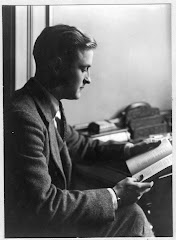As of late, I have been thinking about supplemental materials that are connected to The Great Gatsby. Since our group has been discussing the theme of the American Dream at length, I wanted to search for poetry related to this idea. Here is one poem titled so fittingly:
"The American Dream"
Robert Creeley
Edges and disjuncts, shattered, bitter planes,
a wedge of disconsolate memories to echo fame,
fear of the past, a future still to blame--
Multiple heavens, hells, nothing is straight.
You earn your money, then you wait
for so-called life to see that you get paid.
Tilt! Again it's all gone wrong.
This is a heartless, hopeless song.
This is an empty, useless song.
As a reader, what are your reactions to this poem?
As a teacher, is this something you would use in your classroom in conjunction with Gatsby?
I also found an interesting tidbit that connects Gatsby to a famed author. The link below will take you to an article on the CBC News website (and you have to copy and paste it; for some reason, I'm not able to link it directly to our page). The article discusses author Sylvia Plath, and how a graduate student stumbled upon one of Plath's unpublished poems. This poem supposedly "riffs off" Fitzgerald's work in Gatsby. Is this a potentially interesting avenue to explore with students? I think it could be...
http://www.cbc.ca/news/story/2006/10/31/plath-poem.html
-Liza
Subscribe to:
Post Comments (Atom)


5 comments:
The Creeley poem speaks to the traditional "American Dream" idea that if you work hard enough, things work out. There is often this mentality that you are the only thing blocking yourself from happiness, but it's just not true. There are many obstacles that all people must struggle with in their lives, but always living in anticipation of something better does not seem as fulfilling as finding the happiness in everyday living. Gatsby never seems to be a part of his parties. Rather, he is seen off to the margins. It is suspected that he is throwing the parties in the hope that Daisy will come by, but in the meantime, Nick witnesses Gatsby reaching towards the green light at the end of Daisy's dock. Despite all he has, Gatsby really has so little. His is a "useless song" because we can see that Daisy and Gatsby will never really be together, but Gatsby's belief that hard work and dedication could accomplish anything results in his lifetime of loneliness.
Shrink Poems
For my writing class with Professor Banas, we were instructed to write a shrink poem about a book we recently read. A shrink poem is a condensed version of a text that reveals character, setting, and plot. The stanzas are supposed to be six rhymed lines with a couplet at the end, but allowing students freedom to play with the setup would allow form more creativity. It is a fun way to play with language and to provide a summary of the text, focusing on what you as a reader found significant or memorable. Below in an example of the poem I wrote for class.
Shrink Poem
The Great Gatsby
Nick goes East to escape an engagement
And finds a tiny house for cheap to rent,
Next door to a man in mystery veiled
By party drunks and shady men hailed.
Mr. Jay Gatsby with his fancy yellow carriage
Exists solely on dreams of Daisy and marriage
The West Egg, Nick and Gatsby call home.
In the East Egg, Daisy sits with Jordan, her maids, and her baby, yet poor her all alone.
Tom’s gone to the Valley of Ashes for Myrtle,
These relationships make Nick’s stomach curdle
Along with the whiskey, the heat, and bloody nose,
Nick tells us how all these characters’ worst traits show.
Gatsby’s can’t see that too much time has passed,
He has built up Daisy, preserved her memory under glass,
Five years gone by, a marriage, a child,
Thinking Daisy would come to the West Egg, Gatsby must be wild.
But there’s Daisy crying into Gatsby’s fancy shirts,
Oh Lord, she is an awful flirt.
Try as he may to show her a new life,
Daisy runs back to Tom, playing the part of a devoted wife.
Tom all smug from his triumph over Gatsby
Makes Daisy ride with Jay in his yellow car so fancy,
Daisy tearful behind the wheel,
Never slows and Myrtle’s life steals,
And Wilson beside himself with grief,
Will not stop ‘til he has ultimate peace.
Tom and Daisy, Nick says, are quite a pair,
Playing the world like puppets without a care.
Nicole, I love your poem; thank you for sharing it with us!
I especially like the last line on Tom and Daisy, "Playing the world like puppets without a care." I think it would be interesting for us to discuss this idea of people using people. It's clearly evident in this text, yet I feel that it's something we could really relate to everyday life, not to mention the lives of our students.
By the way, that last "LAI 513" post was from Liza : )
I forgot to type in my "Miss Bateman" google ID.
Sorry!
I think that the idea of using people would be an appropriate theme to focus on with this book. Many students know what it feels like to be used, and would have different opinions on why people might use each other. Nicole and I also discussed using the idea that Gatsby builds up Daisy in his mind so much that she can't possibly live up to his expectations. I will discuss that in another blog.
Post a Comment